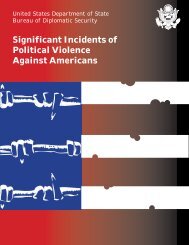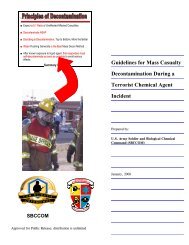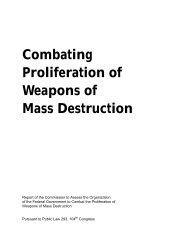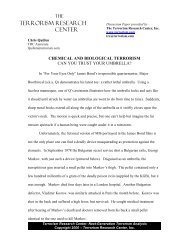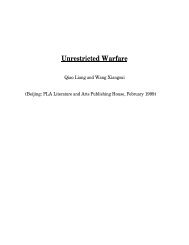Boko Haram Anatomy of a Crisis - Terrorism
Boko Haram Anatomy of a Crisis - Terrorism
Boko Haram Anatomy of a Crisis - Terrorism
You also want an ePaper? Increase the reach of your titles
YUMPU automatically turns print PDFs into web optimized ePapers that Google loves.
<strong>Boko</strong> <strong>Haram</strong>: The <strong>Anatomy</strong> <strong>of</strong> a <strong>Crisis</strong><br />
<strong>Boko</strong> <strong>Haram</strong>, Identity and the Limits <strong>of</strong> Counter-<strong>Terrorism</strong><br />
30 <strong>Boko</strong> <strong>Haram</strong> in 2002.<br />
Ikelegbe posits that ethnic, communal, religious, regional and<br />
sectarian identities are on the rise in Nigeria since they provide a<br />
safe haven for increasing numbers <strong>of</strong> people fleeing an incompetent,<br />
insensitive and, at times, predatory state. The antipathy with which<br />
Nigerians view the state and the concomitant trust with which they<br />
view religious leaders is seen in a Pew Global Attitudes Project.<br />
Asked if religious leaders should play a role in politics, a staggering<br />
91 percent in Nigeria agreed with the statement. This was the highest<br />
<strong>of</strong> all the countries surveyed.<br />
Exclusionary Character <strong>of</strong> the Nigerian State<br />
This antipathy towards the state is made worse by the exclusionary<br />
character <strong>of</strong> the Nigerian post-colonial Nigerian state which is<br />
designed to accentuate and not attenuate differences. For instance,<br />
local and state governments are clearly exclusionary in how they<br />
differentially confer rights on people living in respective jurisdictions.<br />
At local government level, for example, there is a marked distinction<br />
between ‘natives’ or ‘indigenes’ who share the same ethnic, cultural,<br />
religious and linguistic characteristics and who are termed ‘local<br />
citizens’ and ‘immigrants’ or ‘settlers’ who are considered to be<br />
‘non-citizens’ who share different ethnic, cultural, religious, or<br />
linguistic characteristics from the ‘locals’ irrespective <strong>of</strong> how long they<br />
have resided in a particular area and the fact that they are all<br />
Nigerian citizens. Indeed until three years ago, ‘indigeneity’ was a<br />
criterion for qualification to contest in local elections, and not<br />
residency – irrespective <strong>of</strong> whether you lived your entire life in that<br />
locality. The consequences <strong>of</strong> the exclusionary nature <strong>of</strong> the politics<br />
<strong>of</strong> the Nigerian state are clearly seen in narratives amongst ordinary<br />
Nigerians when explaining the violence. Religion, ethnic and regional<br />
identities all feature. Sadly, there is no articulation <strong>of</strong> a common<br />
Nigerian citizenship which effectively transcends these differences.<br />
Although the media has portrayed the conflict as a Muslim vs<br />
Christian issue, there is another ethnic dimension in which the<br />
conflict is being waged as a case <strong>of</strong> reinforcing fault lines. Whilst the<br />
Islamist <strong>Boko</strong> <strong>Haram</strong> may be targeting Christians living in the north,<br />
the perception is that the Hausa-Fulani <strong>Boko</strong> <strong>Haram</strong> are targeting the<br />
Igbo ethnic group resulting in perceptions by the Igbo that this is<br />
‘systematic ethnic cleansing’ and that the ‘Igbos should just secede’.<br />
In response to a <strong>Boko</strong> <strong>Haram</strong> ultimatum that all Christians should<br />
leave the north or face death, the Igbo group, Ogbunigwe Ndigbo,<br />
gave all northern Muslims living in the south two weeks to leave or<br />
face death. In Lokpanta, the Muslim Hausa community, which were<br />
living among the Igbo for decades, took the warning to heart and<br />
were soon leaving the area by the truckload. This perception is given<br />
added credence by Corinne Dufka, a senior West Africa researcher<br />
at Human Rights Watch. Following extensive research on the victims<br />
<strong>of</strong> <strong>Boko</strong> <strong>Haram</strong> violence, Dufka is <strong>of</strong> the opinion that, ‘<strong>Boko</strong> <strong>Haram</strong> is<br />
targeting and killing people in northern Nigeria based on their religion<br />
and ethnicity’ (my emphasis).<br />
In a similar vein, whilst the recurrent violence in Jos has been<br />
portrayed as Muslim-Christian violence, it is fundamentally a land<br />
dispute between ethnic groups who happen to also belong to<br />
different faiths. Interestingly, residents <strong>of</strong> Jos are more aware <strong>of</strong> the<br />
complexity <strong>of</strong> the conflict than analysts. Commenting on the origins <strong>of</strong><br />
the conflict Mohamed Yakuba, a Hausa-Fulani and Muslim resident<br />
<strong>of</strong> Jos, stated, ‘It is the Berom who cause the problem, trying to get<br />
their land back’. Another Jos resident, Toma Davou, a Christian<br />
Berom, also speaking on the origins <strong>of</strong> the conflict argued, ‘The<br />
Hausas want to push us out, and although it is about land<br />
occupation, they say it is religious so that they can get the sympathy<br />
<strong>of</strong> Saudi Arabia and Al Qaeda. Christians should arm to the teeth to<br />
meet this threat from them and <strong>Boko</strong> <strong>Haram</strong>’.<br />
Despite the religious overtones <strong>of</strong> the conflict which <strong>Boko</strong> <strong>Haram</strong> has<br />
encouraged in Jos, the reality is that the dispute is primarily one over<br />
land among people who happen to be divided along lines <strong>of</strong> both<br />
ethnicity and religion. Vanda Felbab-Brown and James Forest also<br />
make the point that much <strong>of</strong> the conflict in northern Nigeria emanates<br />
from the migration by the ethnic Hausa Fulani into Yoruba lands.<br />
They go on to note that the ‘...fact that the Yoruba are predominantly<br />
Christians and the Hausa Fulani Muslims matters only secondarily.<br />
Rather, the Hausa-Fulani <strong>Boko</strong> <strong>Haram</strong> is infusing religion into a<br />
long-churning brew <strong>of</strong> grievances about wealth and power<br />
distribution...’.<br />
Conclusion<br />
For social scientists, the preceding urges us to be wary <strong>of</strong> labelling a<br />
conflict as religious merely on the basis <strong>of</strong> its religious overtones. To<br />
the contrary, the terrorist dimension <strong>of</strong> <strong>Boko</strong> <strong>Haram</strong>’s operations in<br />
Jos underscores the argument that no amount <strong>of</strong> militaristic counter-<br />
31



